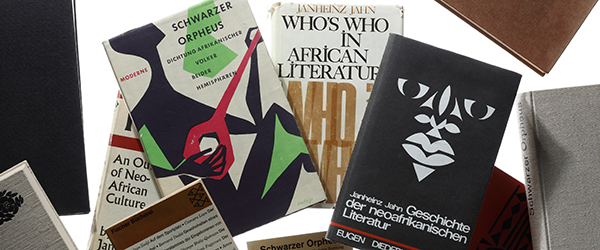
From the beginning, Janheinz Jahn collected not only literature from Africa but also literary works by black writers in other parts of the world, which are sometimes referred to as literature from the African Diaspora but which also form literary traditions of their own, e.g., Caribbean literature, African American literature as well as more narrowly defined regional or national literatures, such as literature from Martinique or Haiti.
While the literary works from these traditions, which Jahn was able to collect, are still part of the Jahn Library this part of the collection is not actively expanded any more. More recent literary works by writers from these traditions are, however, collected by the University Library, individual departmental libraries as well as the USA Library instead and can be searched through the University Library's online catalogue.
In his Geschichte der neoafrikanischen Literatur (1966), which was translated into English as Neo-African Literature: A History of Black Writing (1968), Jahn elaborated on his concept of 'Neo-African' literature. He began by problematising the classicfication of literature on the basis of language – "a handy method of classification which was justifiable enough until the beginning of this [i.e., the 20th] century" (Jahn 1968: 16). Literature, accordingly, was "national literature, the nation from a literary point of view was identical with the area where the language was used" (1968: 16). In the course of the twentieth century, North American Literature was the first to emancipate itself as an independent literary tradition. Writers no longer deferred "to European judgement" but
Jahn argued that works by writers from Africa, but also from the African Diaspora cannot necessary be classified by the language in which they are written. He proposed that
In Jahn's opinion, what he called 'Neo-African literature" formed one 'tradition of similar styles and attitudes' across linguistic as well as national or regional boundaries. He defined this tradition as being informed by modern, or European, elements as well as by African elements:
However, Jahn (1968: 22) himself already conceded that although "theoretically simple, the distinction is hard to make in practice, for it assumes that the styles, patterns of expression and attitudes produced by Africa's traditions are well known, but they are not".
Today, Jahn's conception of a 'neo-African' literature may seem out-dated. Only a few years later Jahn himself rather referred to 'African literature' in the titles of the Bibliography of Creative African Writing (1971), which he co-edited with Claus Peter Dressler, and the Who’s Who in African Literature (1972), co-edited with Ulla Schild and Almut Nordmann. It was, however, the precondition for Jahn's pioneering conception of an African literary tradition in its own right. The concept of a 'neo-African' literature and culture has also played a significant role in the construction of African American and Caribbean identities. Last but not least, Jahn's interest in and research on 'neo-African' literature have contributed to linking up black writers all over the world (cf. Jahn 1954).
Works cited
Jahn, Janheinz, 1954b: "Verblüffende Wirkung eines Lyrikbandes: 600 Briefe an die Neger aller Kontinente". Die Welt, 25 November.
Jahn, Janheinz, 1958: Muntu: Umrisse der neoafrikanischen Kultur. Düsseldorf: Eugen Diederichs.
Jahn, Janheinz, 1965: Die neoafrikanische Literatur: Gesamtbibliographie von den Anfängen bis zur Gegenwart. Düsseldorf: Eugen Diederichs.
Jahn, Janheinz, 1966: Geschichte der neoafrikanischen Literatur: Eine Einführung. Düsseldorf: Eugen Diederichs.
Jahn, Janheinz, 1968: Neo-African Literature: A History of Black Writing. New York: Grove Press.
Jahn, Janheinz and Claus Peter Dressler, 1971: Bibliography of Creative African Writing. Nendeln, Liechtenstein: Kraus Reprint.
Jahn, Janheinz, Ulla Schild and Almut Nordmann, 1972: Who's Who in African Literature. Biographies, Works, Commentaries. Tübingen: Horst Erdmann.
© Anja Oed